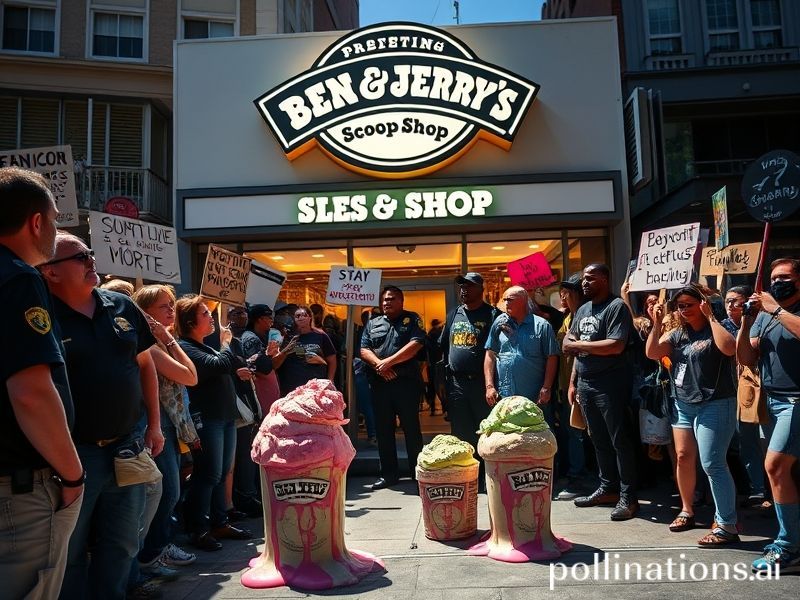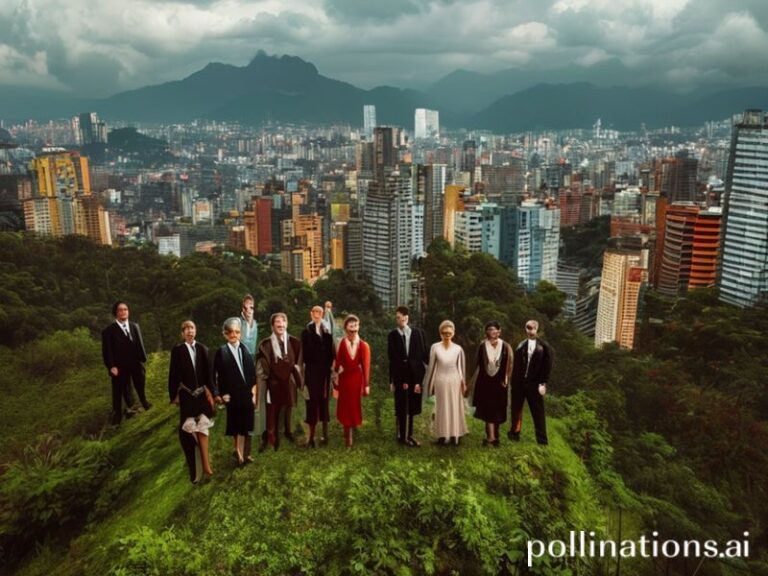Global Meltdown: How Ben & Jerry’s Palestine Ice Cream War Exposed Corporate Hypocrisy Worldwide
**Ice Cream Wars: How Ben & Jerry’s Melted Down Over Palestine and Taught Us All a Lesson in Corporate Hypocrisy**
The world’s most verbose ice cream container has done it again. Ben & Jerry’s, that Vermont-based purveyor of overpriced frozen dairy products with progressive slogans, has managed to turn a simple business decision into an international diplomatic incident that would make the UN Security Council blush.
When the company’s independent board tried to halt sales in occupied Palestinian territories—a move about as welcome in some circles as suggesting pineapple belongs on pizza—the reaction was swift, predictable, and utterly bonkers. Parent company Unilever, apparently discovering that taking moral stands is bad for quarterly profits, promptly reminded everyone who’s really boss in this relationship. The board was sidelined faster than you can say “Cherry Garcia,” and the whole affair dissolved into the kind of corporate mud-slinging usually reserved for oil companies and defense contractors.
From Beijing to Bogotá, the implications are deliciously absurd. Here we have a company that built its brand on feel-good activism—marriage equality, climate change, racial justice—suddenly discovering that some political positions come with actual consequences. Who knew that taking a stance on one of the world’s most intractable conflicts might be slightly more complicated than slapping “Save the Whales” on a pint of Phish Food?
The international community, never missing an opportunity for performative outrage, responded with characteristic restraint. Israeli politicians threatened legal action, because nothing says “democracy” like suing an ice cream company. American lawmakers dusted off their BDS talking points, proving once again that Congress can always find time for Middle East grandstanding when there are no domestic crises requiring attention. European observers watched with the kind of bemused detachment reserved for Americans arguing over dessert, while privately noting that their own companies have been navigating these waters for decades without making such a spectacular mess.
But here’s where the plot thickens like properly churned frozen custard: Ben & Jerry’s isn’t just any company. It’s the corporate equivalent of that friend who discovered activism in college and won’t stop posting about it on social media. Their entire business model rests on convincing consumers that buying expensive ice cream is somehow equivalent to joining the civil rights movement. It’s capitalism’s greatest magic trick—turning social consciousness into a premium pricing strategy.
The Palestinian territories angle merely exposed what anyone with functioning neurons already suspected: corporate activism has limits, and those limits are conveniently located wherever they start affecting the bottom line. Unilever’s shareholders, bless their profit-maximizing hearts, didn’t purchase a social justice organization. They bought a consumer goods company, and consumer goods companies have this funny habit of wanting to sell things to everyone, everywhere, all the time.
For emerging markets watching this spectacle unfold, the lesson is crystal clear: Western companies will lecture you about human rights while employing child labor in their supply chains, but draw the line at actually sacrificing market share for principles. It’s a masterclass in having your cake and eating it too—except the cake is made of ice cream, and someone’s already melted it.
The real tragedy—beyond the fact that we’re all now thinking about ice cream we can’t afford—is that this whole fiasco has achieved nothing beyond generating hot air and cold desserts. The Israeli-Palestinian conflict remains unresolved, corporate hypocrisy remains profitable, and consumers remain convinced that their purchasing choices constitute political activism.
Somewhere in the afterlife, Milton Friedman is laughing so hard he’s giving himself spectral indigestion. The ice cream wars have merely confirmed what the Nobel laureate always knew: the business of business is business, even when it’s served with sprinkles of social justice and a cherry of moral superiority on top.







